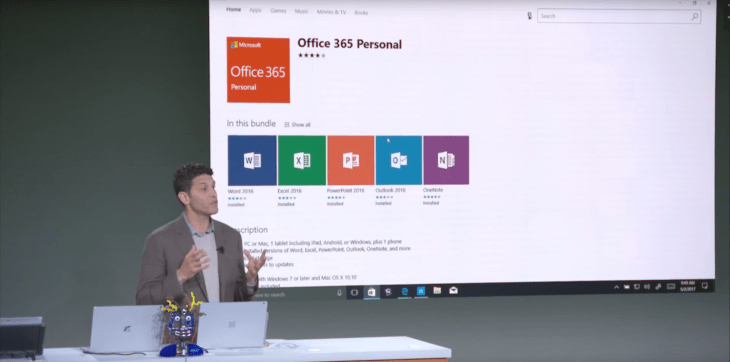Microsoft just unveiled a new operating system at a press event this morning. Windows 10 S is a streamlined and more secure version of Windows 10. But it still looks and feels like a normal PC. And it runs essential apps like Word, Excel and PowerPoint.
While I haven’t used Office apps for years, I spent most of my days using them back when I was in a student. I used Word to write papers, PowerPoint to prepare presentations and Excel to calculate stuff. And this is a great way to convince companies to buy Office subscriptions as most employees are already familiar with Office apps.
Microsoft is fully aware of that and plans to take advantage of that with its Chromebook competitors.
Sure, you can use Word Online, Google Docs and other web apps on your Chromebook. And Google has been saying for years that you’ll soon be able to run Android apps on your Chrome OS device. But very few Chromebooks currently support Android apps, such as Word, Excel and PowerPoint for Android.
Microsoft is restricting Windows 10 S devices to Windows Store apps. It means that you won’t be able to download app from the your browser and install it. Developers will have to submit their apps to the Windows Store first.
But the company instantly reassured everyone by saying that Office apps are coming to the Windows Store soon. So it means that you’ll be able to buy a $189 Windows 10 S laptop and run full-fledged Office apps. And if you’re a student or teacher, Office 365 is free. Update: Office 365 for Education only gives you free access to online versions of Office apps, so you’ll still have to get a license through your school.
Microsoft is probably going to use Office apps in its advertising campaigns for Windows 10 S devices as it’s a sweet deal if you want a cheap device that runs Word. This is going to be Microsoft’s killer feature when it comes to selling those devices and eating up Chromebook’s market share.
Now it’s still going to take years as schools don’t take this kind of decisions lightly. Districts don’t switch to another vendor because Microsoft is slightly ahead of the competition. It’s going to be a long fight, but it looks like Microsoft thinks it’s worth starting it.
